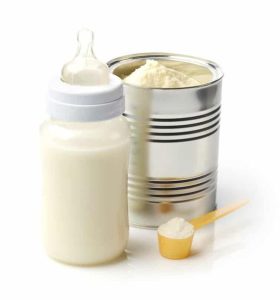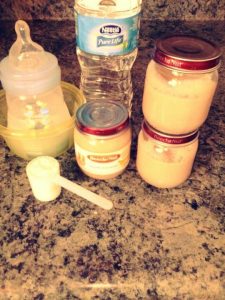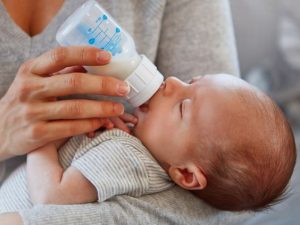Formula is a safe and healthy way to feed your baby when you can’t breastfeed. However, there’s a lot of information out there about storing and preparing formula. One question that pops up often is: can you freeze baby formula?
Understanding Formula Safety: Why Freezing Isn’t Recommended
Freezing formula is generally not recommended by health organizations like the Centers for Disease Control and Prevention (CDC) and the American Academy of Pediatrics (AAP). Here’s why:
Nutrient Loss:
Freezing can break down some of the nutrients in formula, making it less nutritious for your baby.
Bacterial Growth:
Improper thawing can lead to bacterial growth in formula, which could make your baby sick.
Container Issues:
Freezing can cause formula to expand, potentially damaging the container. Leaky or broken containers could contaminate the formula.
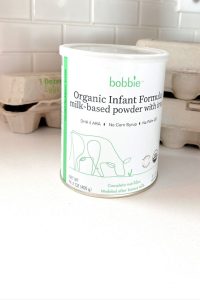
Safe Storage and Handling Practices
Here are some key things to remember about safe formula storage and handling:
-
Follow Package Instructions: Always follow the storage and preparation instructions on the specific formula you’re using.
-
Store Unopened Formula: Keep unopened containers of formula in a cool, dry place. Don’t store them in extreme heat or cold.
-
Opened Formula: Once opened, formula should be refrigerated and used within 24 hours.
-
Discard Unused Formula: Throw away any unused formula after feeding time. Don’t save it for later use.
-
Cleanliness is Key: Wash your hands thoroughly with soap and warm water before preparing formula.
-
Sterilize Bottles and Nipples: Follow the manufacturer’s instructions for sterilizing bottles and nipples before each feeding.
By following these safe storage and handling practices, you can help ensure your baby gets the nutrients they need from formula.
Alternatives to Freezing Formula: Keeping it Safe on the Go
If you’re worried about having formula available when you’re out and about, here are some alternatives to freezing:
-
Pre-measured Formula: Many companies sell pre-measured formula pods or bottles that are convenient for travel.
-
Thermos Bags: A thermos bag can help keep prepared formula cool for a short time, typically up to 4 hours. Always check the temperature of the formula before feeding your baby.
-
Boil and Cool Method: If you absolutely need to prepare formula without refrigeration, you can use the boil and cool method. However, this should only be used as a last resort. Be sure to follow the specific instructions carefully to avoid contamination.
Consulting Your Pediatrician: Getting the Best Advice
If you have any questions or concerns about formula storage or feeding, always talk to your pediatrician. They can provide you with personalized advice based on your baby’s needs.
While freezing formula might seem like a convenient way to store extra supply, it’s important to prioritize your baby’s safety. By following safe storage and handling practices, and consulting your pediatrician for guidance, you can ensure your baby gets the healthy nutrients they need from formula.
We already explored why freezing baby formula isn’t recommended. Let’s focus on safe practices for storing and handling formula to ensure your baby gets the best possible nutrition.
Following the Guidelines: Trusted Sources for Safe Handling
Here are some resources from trusted organizations that provide clear guidelines on safe formula storage and handling:
- Centers for Disease Control and Prevention (CDC): https://www.cdc.gov/nutrition/infantandtoddlernutrition/formula-feeding/infant-formula-preparation-and-storage.html
- American Academy of Pediatrics (AAP): https://www.healthychildren.org/English/ages-stages/baby/formula-feeding
Following the recommendations from these reputable sources is crucial for ensuring your baby’s formula is handled safely.
Key Takeaways for Safe Formula Handling
Here are some key points to remember for safe formula preparation and storage:
- Always follow the instructions: Each formula brand might have slightly different preparation and storage instructions. Refer to the specific information on the formula you’re using.
- Store unopened formula properly: Keep unopened containers of formula in a cool, dry place. Don’t store them in extreme heat or cold.
- Refrigerate opened formula: Once opened, formula should be stored in the refrigerator and used within 24 hours.
- Discard unused formula: Throw away any unused formula after feeding time. Don’t save it for later use.
- Cleanliness is key: Wash your hands thoroughly with soap and warm water before preparing formula.
- Sterilize bottles and nipples: Follow the manufacturer’s instructions for sterilizing bottles and nipples before each feeding.
Alternatives for Travel and Convenience
If you’re concerned about having formula available on the go, here are some alternatives to freezing:
- Pre-measured formula: Many companies sell pre-measured formula pods or bottles that are convenient for travel.
- Thermos bags: A thermos bag can help keep prepared formula cool for a short time, typically up to 4 hours. Always check the temperature of the formula before feeding your baby.
Safe Formula Handling: Keeping Baby’s Food Fresh
We already discussed why freezing formula isn’t recommended. Let’s focus on safe practices to keep formula fresh and ensure your baby gets the best nutrition.
Here are some tips for storing and handling baby formula:
- Follow the label: Each formula brand has specific storage instructions. Refer to the label for the best way to store your baby’s formula.
- Cool and dry for unopened containers: Keep unopened containers of formula in a cool, dry place like a pantry or cabinet. Avoid extreme heat or cold.
- Fridge after opening: Once a container of formula is opened, it needs to be refrigerated. Use it within 24 hours of opening.
- Discard unused formula: Throw away any formula leftover after feeding time. Don’t save it for later.
- Cleanliness matters: Always wash your hands thoroughly with soap and warm water before preparing formula.
- Sterilize bottles and nipples: Follow the manufacturer’s instructions for sterilizing bottles and nipples before each feeding.
By following these tips, you can ensure your baby’s formula is handled safely and stays fresh.
Alternatives for Travel and Convenience
If you’re on the go and worried about having formula available, here are some freezing alternatives:
- Pre-measured formula: Many companies offer pre-measured formula pods or bottles, perfect for travel.
- Cooler bags: A cooler bag can keep prepared formula cool for a short time, usually up to 4 hours. Always check the temperature before feeding your baby.
If you have any questions or concerns about formula storage or feeding your baby, always consult your pediatrician. They can provide you with personalized advice based on your baby’s needs.
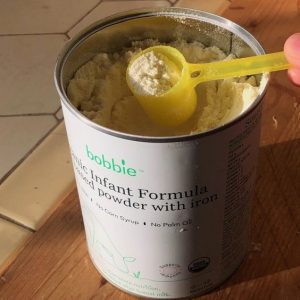
Conclusion: Prioritizing Safe Practices
By following these safe storage and handling practices, you can ensure your baby receives the proper nutrients from formula. Remember, if you have any questions or concerns, always consult your pediatrician for personalized advice. They can guide you on the safest feeding practices for your baby’s specific needs.

